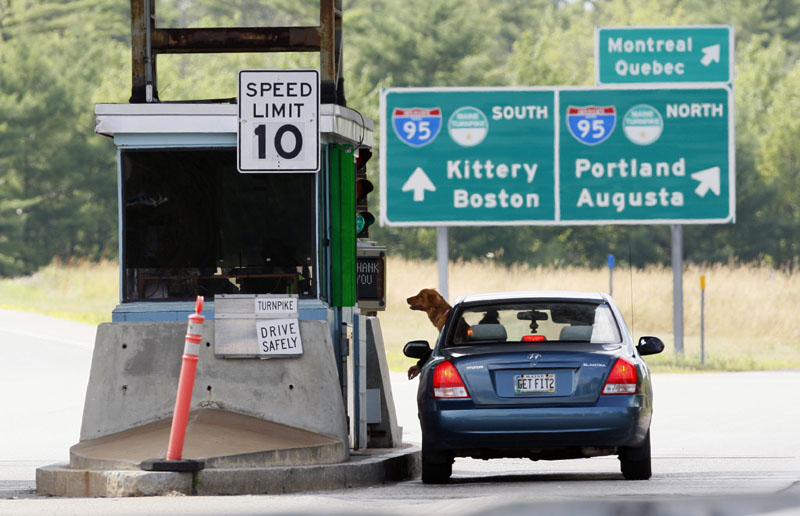PORTLAND — The Maine Turnpike Authority is poised to scale back its proposed toll increases by delaying long-term projects, but still must decide how to raise the additional $21.5 million it needs annually to cover long-term debt.
The authority’s directors spent several hours Thursday discussing ways to make toll increases as fair as possible, but the discussion showed that fairness is in the eye of the beholder.
Some board members want to minimize toll increases on trucks, while others want to minimize the impact on people who use the turnpike for short trips or pay their tolls with the E-ZPass.
“We learned where the board has consensus and where the board has differences,” Executive Director Peter Mills said after the meeting.
Those differences may be settled at the board’s next meeting on Aug. 2.
Thursday’s meeting was the first chance board members had to discuss with each other the various toll increases that have been proposed by the authority’s staff, said Chairman Daniel Wathen.
“There will be a lot of criticism, no matter what we do,” he said just before ending the five-hour meeting.
The authority started the day with some good news, that it won’t necessarily have to raise as much money as previously expected.
The overall toll increase can be reduced from $26 million to $21.5 million a year because some projects won’t be done as quickly as originally planned.
Some, like a Lewiston interchange, have already been delayed because of permitting and land acquisition. Others, like replacing green exit signs, can be put off without consequence.
That work still would get done, but delaying the borrowing to pay for it would reduce the bond payments needed from 2014 to 2018, when the authority faces a payment “plateau.”
Debt payments will be highest in those years in part because of new capital projects, and because when the authority borrowed to widen the turnpike’s southern end in 2000, it delayed paying down the principal until 2008.
The strategy made sense when turnpike traffic — and in turn toll revenue — was growing 2.5 percent every year.
But the recession hit in 2008 and traffic dropped off for the first time in 61 years, especially truck traffic. Today’s turnpike traffic is at 2003 levels.
The toll increases are proposed to make up that shortfall.
The Maine Turnpike is among the cheapest of the nation’s 104 toll roads, said Paul Godfrey, a consultant for the authority. It is the 18th cheapest now, and would be about the 27th cheapest with the toll increases.
The authority’s staff has floated 10 toll-increase scenarios, and there can be mixing and matching within each. The authority has held six public hearings on the proposals. A summary of the comments is on the turnpike authority’s website at www.maineturnpike.com/Toll-Adjustments-Info.aspx.
The most heavily attended hearing was in the Lewiston-Auburn area, which is heavily dependent on the turnpike, especially for trucking-related businesses.
Board member Robert Stone, who represents the Lewiston-Auburn area, wants to limit toll increases for trucks, which now are charged four times the tolls for cars.
One proposal would raise the rate for trucks to 4.25 times the car rate, which Stone said is too much.
He said it would hit the trucking industry — and industries that depend on it — hard at a time when they are reeling from the recession.
Residents from that area also object to increases proposed at the New Gloucester toll plaza, on their primary route to Portland and all points south. Mills said the reduction in the money needed from tolls should reduce the increase at that tollbooth.
Stone said the turnpike authority could raise more money and address a fairness issue if it charged more for motorists to get off the turnpike onto Interstate 295 in South Portland or Falmouth and used exit tolls to eliminate local routes that people use to skip those toll plazas.
The idea appeared to gain little traction.
James Cloutier, a Cumberland County representative, said the higher tolls for trucks could reduce the increases for other motorists, including E-ZPass users.
While the turnpike staff’s latest recommendation calls for truck tolls to remain four times those of car tolls, Cloutier favors the recommendation for trucks to be charged 4.25 times as much.
One proposal, which appears to have strong backing, would give bulk discounts to E-ZPass users. Users who make 20 to 30 trips per month would get a 10 percent discount. Those who make 50 to 60 trips would get a 40 percent discount.
Per mile, E-ZPass tolls are always lower than the cash price paid for a given stretch of the highway.
The bulk discounts would be good for commuters and push people to use the E-ZPass, which saves the turnpike money, Mills said.
Authority members agreed that converting drivers to the E-ZPass improves fairness — a major theme in the public hearings — because users pay only for the miles they drive.
Staff Writer David Hench can be contacted at 791-6327 or at:
dhench@pressherald.com
Copy the Story LinkSend questions/comments to the editors.



Success. Please wait for the page to reload. If the page does not reload within 5 seconds, please refresh the page.
Enter your email and password to access comments.
Hi, to comment on stories you must . This profile is in addition to your subscription and website login.
Already have a commenting profile? .
Invalid username/password.
Please check your email to confirm and complete your registration.
Only subscribers are eligible to post comments. Please subscribe or login first for digital access. Here’s why.
Use the form below to reset your password. When you've submitted your account email, we will send an email with a reset code.